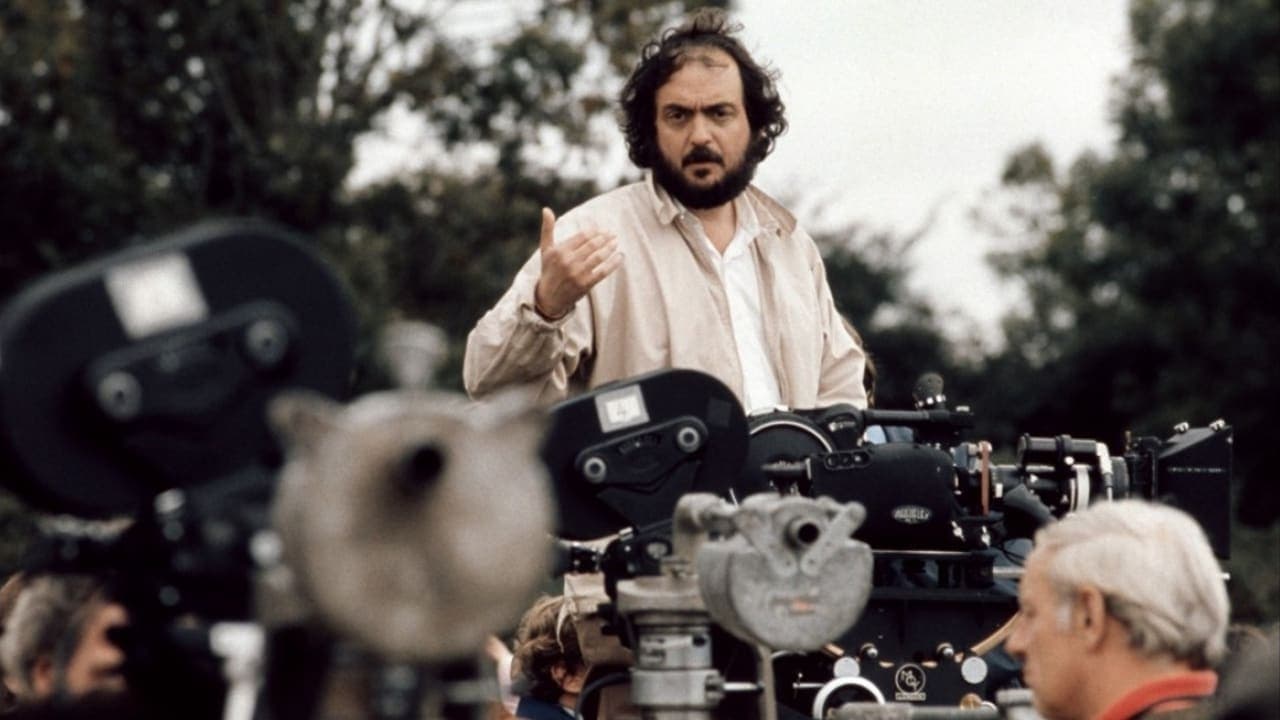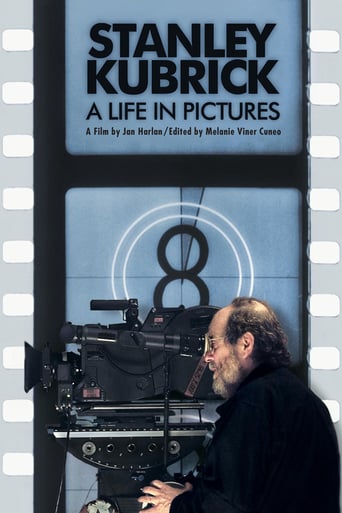

Very very predictable, including the post credit scene !!!
... View MoreThe greatest movie ever!
... View MoreSERIOUSLY. This is what the crap Hollywood still puts out?
... View MoreDid you people see the same film I saw?
... View MoreAn excellent examination of an excellent artist, but also, an honest one. "A life in pictures" depicts every essential moment in Stanley Kubrick's life, not leaving aside any detail, just as he used to do at the moment of making a film. It is true, he was an odd person and different from others, some hated him and others loved him; at the end, he wasn't praised for being an example of human being, he was praised for the quality of filmmaker and artist he was.The film has the testimony of people who knew him, from schoolmates to actors. This gives you a more wide perspective of who he was as a person, and as a filmmaker. It will prove a challenge to label him as a person, especially when you see his relationship with Shelley Duvall, but his work as a director is miraculous. One thing that I found amusing was the fact that he shared one specific characteristic with Alfred Hitchcock: he assumed complete control of his movies. That's what made his movies, well, HIS MOVIES! Gloriously detailed work from the life of undeniably, the best movie director of all time.FINAL CONSENSUS: From birth to death, from personal footage to actual interviews, A Life in Pictures portrays in an excellent manner both the man and artist that worked behind the lens.
... View MoreIt's a fine, straightforward, and kind biography of film director Stanley Kubrick, from his birth in New York to his death at seventy at his home in Hartfordshire.There are plentiful clips from his movies and many still photos. There are more than a dozen talking heads -- fellow directors, old friends, colleagues, school chums. They all go rather easy on Kubrick. There were some "disagreements" between producer/star Kirk Douglas and Kubrick over "Spartacus." "Disagreements" is a carefully chosen word. Douglas is more candid in his autobiography, "Ragman's Son," in which Kubrick is described as "a talented s***." A head observes that Kubrick was lucky to have had the assistance on "Dr. Strangelove, Or How I Learned To Stop Worrying And Love The Bomb," of two of the funniest and most creative people of the era: Peter Sellers, who was allowed to ad lib while Kubrick kept the cameras running, and Terry Southern, a font of madcap ideas, the writer who gave us "PRE-vert." One of the writers points out that in his maturity Kubrick tended to think of his stories in several independent "unsinkable units," meaning blocks of scenes, and then only later trying to link them together in the narrative. It's most obviously the case in the astonishing "2001: A Space Odyssey," but it's also apparent in later works like "Full Metal Jacket" and sometimes the seams show.It's not usually remarked on but Kubrick's use of music was highly original too. Before "Dr. Strangelove" and "2001," the score was designed to heighten the emotions being displayed. Classical music was used only rarely, and then as a substitute for the usual background. After "Dr. Strangelove" and especially "2001," new vistas opened for the use of music in films. It's almost impossible to imagine "2001" without the Strauss waltz, or the "stargate" sequence without the unnerving white noise of Gyorgi Ligeti. Who had ever heard of Gyorgi Ligeti? Nobody, whereas everyone knows Tchaikovsky and Rachmaninoff, whether they know they know it or not. And of course post-1968 everyone had heard Richard Strauss' "Also Sprach Zarathustra." I remember its being used in TV commercials.Like most of his mature movies, "A Clockwork Orange" was "controversial." I think the word was first applied to "Lolita." Anyway, some of the media vilified Kubrick and his "excremental vision." At several showings there were violent incidents after the film was shown. I'm not sure his vision should be called that but it's certainly true that as he got older there was less humanity in his work. Nothing -- before or after -- equals the scene at the end of "Paths of Glory" in which a frightened young girl inexpertly sings a simple German folk song and in doing so enthralls the raucous audience of doomed French soldiers, so that they stop shouting and begin to quietly hum along with her. I can't watch it without being moved. Following that, his characters become less and less involved with one another, cooler and more distant. Maybe his next hard look at warmth and the doubt that lies behind it is in his last film, "Eyes Wide Shut." There won't be any more Kubrick movies and it's the film world's loss, just as it lost Fellini, Hitchcock, and David Lean. I mention them because flâneurs talked about their work the same way. When is the next Fellini movie? What's David Lean's next picture about? There won't be any more questions about these directors and it's too bad because much of what we see on the screen now is barely fit for human consumption.
... View More*SPOILER ALERT* *SPOILER ALERT*I've always been fascinated by Stanley Kubrick. Everyone knows he's a genius, made great movies etc. But the thing I found most intriguing about him was how intellectually interested he was in almost every subject matter under the sun. He could talk your ear off about whatever topic was on your mind. War, science, philosophy, you name it. In many of the books I've read about him, most people talk about how Kubrick always kept in touch with them yet they hardly ever saw him in person. Kubrick would constantly be asking them questions to see what knowledge he could get out of them. I also thought it was interesting how he always seemed to be sending books to people whenever something struck him as interesting and how you should drop what you're doing and read what he sent you.Another aspect of Kubrick I admired was how he wanted his movies to be seen by as many people as possible. It seems like some directors make movies only for themselves. Kubrick wanted mainstream success but made his movies as challenging as possible. I wonder if he ever saw a contradiction in making movies as intelligently as he did and the desire of the mainstream film going public for simplistic entertainment."Stanley Kubrick: A Life in Pictures" goes through each one of his movies and talks to various participants about their memories of working with Kubrick. But clearly since the documentary was put together by Kubrick's friends and family, it's not going to take an overly critical view of him or his movies. Ask Stephen King how he feels about Kubrick and you might not get the glowing praise that everyone else lays out. But overall, I found the documentary to be interesting. It's just unfortunate that Kubrick never took the time to set the record straight on anything. It would have been nice to hear him speak for himself instead of having half of Hollywood do it for him. That, of course, is his appeal. In an age of blah, blah, blah celebrities, here's a guy who doesn't care what you or I thought about him or his movies. His job was over when the movie came out. You liked it or didn't and life went on.For people who don't know anything about Kubrick, the documentary is a good overview. But for others who do know a little something, it doesn't really add anything new to the Kubrick picture with the exception of a few home movies. This is not the last word on Stanley Kubrick. There probably never will be a last word.One last thing, check out the "making of" documentary on "The Shining" DVD. It has a lot of scenes of Kubrick at work. It gives a fascinating look at Kubrick dealing with the actors, especially poor Shelley Duvall. He was the kind of boss who never raised his voice but you could tell by looking at his eyes that he was fed up with you.
... View MoreI only have two problems with this otherwise fantastic documentary: Tom Cruise's narration and the fact that EVERYONE he worked with (actors, producers, studio heads) just praised and praised the man as a "difficult but genius" force. From what I've read, there are probably several hundred people who hated him when he was alive. He was especially cruel to Shelley Duvall, and I've read interviews with her when Kubrick was ALIVE, who said making The Shining was the worst experience of her life. Now, in this documentary, she talks about how she has absolutely no regrets, because it made her "smarter." Maybe so. But more than likely there would have been a completely different attitude if this documentary had been made while he was still alive. And Tom Cruise's narration--I kept hearing "I worked with the greatest director of all time on his last movie, so there!" in his self-important narration. Malcolm McDowell would have been a more appropriate choice, in my opinion, as the humble narrator. But all in all, this is an excellent examination of a brilliant mind, a trade photographer who made arguably the greatest string of films in the history of cinema, from Lolita to The Shining (at least in my humble opinion).
... View More